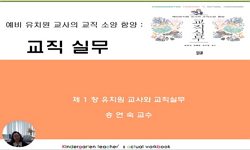Biesta’s discourse on teachers centers on two concepts, which are teacher professionalism and teacher agency, and suggests a virtue-based approach to teacher education. In Biesta’s discourse, teacher professionalism is investigated through in/out ...
http://chineseinput.net/에서 pinyin(병음)방식으로 중국어를 변환할 수 있습니다.
변환된 중국어를 복사하여 사용하시면 됩니다.
- 中文 을 입력하시려면 zhongwen을 입력하시고 space를누르시면됩니다.
- 北京 을 입력하시려면 beijing을 입력하시고 space를 누르시면 됩니다.

교사 전문성과 교사 행위자성: 비에스타의 관점을 중심으로 = Teacher Professionalism and Teacher Agency in Biesta’s Discourse on Teachers
한글로보기부가정보
다국어 초록 (Multilingual Abstract)
Biesta’s discourse on teachers centers on two concepts, which are teacher professionalism and teacher agency, and suggests a virtue-based approach to teacher education. In Biesta’s discourse, teacher professionalism is investigated through in/out phase and surface/depth phase, and is finally defined as professional judgement and virtue in the Aristotelian sense. Teacher agency is a concept which aims to illuminate teacher professionalism in terms of teacher’s contextual and temporal interaction with her environment. As a way to help teachers achieve enhanced agency and make a professional judgement, Biesta argues that teachers should have access to a robust professional discourse on teaching and education which invites teachers to the question of what education is for. It is by engaging with this fundamental question of education that they become not just technical-competent teachers but good teachers. Biesta’s discourse on teachers finds its philosophical basis in the anti-metaphysical combination of Aristotle’s ethics and Dewey’s pragmatism, and thus what Biesta means by a robust professional discourse on teaching and education is likely to be narrowly conceived such that some excellent metaphysical theories and research on education are regrettably marginalized in teacher education. Biesta’s discourse on teachers contains some significant implications for the current culture of education and these can be enriched when it is reconstructed towards a more refined philosophical orientation.
국문 초록 (Abstract)
비에스타의 교사론은 교사 전문성과 교육 행위자성을 핵심 개념으로 삼고 있으며, 전체적으로 교사교육에 대한 덕기반 접근을 나타내고 있다. 비에스타의 교사론에서 교사 전문성은 교사의...
비에스타의 교사론은 교사 전문성과 교육 행위자성을 핵심 개념으로 삼고 있으며, 전체적으로 교사교육에 대한 덕기반 접근을 나타내고 있다. 비에스타의 교사론에서 교사 전문성은 교사의 안과 밖, 교사 존재의 표면과 심층이라는 두 국면에 걸쳐 논의되며 최종적으로 교사의 판단 또는 덕으로 규정된다. 교사 행위자성은 교사 전문성을 교사와 환경의 상호작용 국면에서 조명하기 위한 개념으로서, 상호작용은 맥락과 시간이라는 두 축의 결합으로 분석된다. 비에스타는 교사가 고양된 행위자성을 획득하여 전문가적 판단을 발휘할 수 있도록 하기 위한 방안으로 교육에 대한 전문적 담론을 교사교육의 핵심적 내용으로 제시한다. 이 담론을 통하여 교사는 교육의 목적이 무엇인가를 묻고 그 물음에 대한 대답을 추구하도록 요구받으며, 그 과정에서 기능적이고 역량있는 교사를 넘어 훌륭한 교사로 나아갈 수 있다. 비에스타의 교사론은 아리스토텔레스 윤리학과 프래그머티즘이 보여주는 탈형이상학적 삶의 지향을 철학적 기초로 삼고 있으며, 이러한 철학적 특징으로 인하여 비에스타가 제안하는 전문적 담론은 교육에 관한 탁월한 이론들이 배제된 좁은 것으로 설정될 가능성이 있다. 비에스타의 교사론은 교육에 대한 관심이 효과성과 효율성에 과도하게 집중되고 교사 정체성이 위기를 맞고 있는 오늘날 중요한 의미를 가지며, 인간적 세계와 초월적 세계라는 이원론을 넘어 삶과 교육을 총체적으로 바라보는 관점으로 재해석될 때 그 의미가 더 풍부해질 수 있다.
동일학술지(권/호) 다른 논문
-
위기 상황에서 교육행정 원리의 재구성과 적용: 코로나 상황 분석을 중심으로
- 한국초등교육학회
- 유길한
- 2025
- KCI등재
-
예비 초등교사를 위한 가창 실수관리 척도 개발 및 타당화
- 한국초등교육학회
- 김지혜
- 2025
- KCI등재
-
- 한국초등교육학회
- 신춘호
- 2025
- KCI등재
-
제주지역 전입생의 초등학교 전입 초기 경험에 대한 상호문화주의적 분석
- 한국초등교육학회
- 문현식
- 2025
- KCI등재




 KISS
KISS






